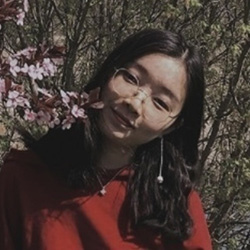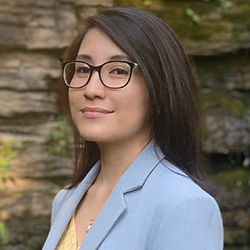Lily Ge and Mara Ulloa Awarded NSF Graduate Research Fellowships
The five-year fellowship is awarded to outstanding graduate students in STEM
Northwestern Engineering computer science PhD students Lily Ge and Mara Ulloa have been awarded National Science Foundation (NSF) Graduate Research Fellowships (GRF) in recognition of their demonstrated potential for significant research achievements.
The highly selective GRF program awards a five-year fellowship to outstanding individuals early in their graduate career who are pursuing a full-time, research-based graduate degree in science, technology, engineering, and mathematics (STEM) disciplines. Ge and Ulloa will receive three years of financial support, including an annual stipend.
Lily Ge
 Ge is a second-year PhD student in computer science advised by Matthew Kay, assistant professor of computer science at the McCormick School of Engineering and of communication studies at Northwestern’s School of Communication. She is a member of the Midwest Uncertainty Collective (MU Collective) lab, codirected by Kay and Jessica Hullman, Ginni Rometty Professor and associate professor of computer science at Northwestern Engineering.
Ge is a second-year PhD student in computer science advised by Matthew Kay, assistant professor of computer science at the McCormick School of Engineering and of communication studies at Northwestern’s School of Communication. She is a member of the Midwest Uncertainty Collective (MU Collective) lab, codirected by Kay and Jessica Hullman, Ginni Rometty Professor and associate professor of computer science at Northwestern Engineering.
“Being a fellow in the NSF Graduate Research Fellowship Program is a valuable acknowledgment of my past accomplishments and truly a door to a whole world of possibilities,” Ge said. “If I keep striving toward what I have started, I will be able to achieve what I can envision.”
Within the broad scope of human-computer interaction (HCI), Ge’s research centers around how visualizations can assist in decision-making and problem-solving processes. Ge aims to improve visualization literacy by designing and developing tools to help people build resilience against visualization misinformation to maintain well-informed communities. She plans to test the effectiveness of such tools with improved visualization literacy assessments and, finally, to scale up the interventions to reach a broader audience.
“Visualizations can be manipulated to exacerbate the spread of misinformation, so it is crucial for the public to be able to distinguish between the accurate and inaccurate visual representations to ensure the quality of the information consumed,” Ge said.
During her first-year graduate studies at Northwestern, Ge studied visualization misinformation with the goal of broadening the understandings of visualization literacy. The project, “Critical Thinking Assessment for Literacy in Visualizations (CALVI),” earned a best paper honorable mention at the ACM Human Factors in Computing Systems (CHI) 2023 conference.
Building upon her prior work, Ge also investigates how to foster the critical thinking skills necessary to be less susceptible to misinformation. As a current Design Cluster fellow, she works closely with Kay and Steve Franconeri, professor of psychology at Northwestern’s Weinberg College of Arts and Sciences and (by courtesy) of computer science at Northwestern Engineering, to develop a framework specifically designed to support data-based reasoning with visualizations.
Ge earned a bachelor’s degree in computer science from the University of Michigan. She was a member of the student team that contributed to the design, development, testing, quality control, and project management for the MI Symptoms App, a statewide online tool to help individuals and employers check for symptoms related to COVID-19, prevent outbreaks, and help inform Michigan’s reopening.
During her undergraduate studies, she was also an instructional aide in web design/development courses and worked closely with Colleen van Lent at the University of Michigan’s School of Information.
Through the Undergraduate Research Opportunity Program, Ge was a member of the University of Michigan team that competed in the semi-finals of Amazon’s Alexa Prize Socialbot Grand Challenge 3. The students developed Audrey, an open-domain conversational chat-bot that aims to engage customers on informational, personal and relational levels.
“I would like to emphasize how grateful I am for the support I've gotten from my adviser, mentors, and colleagues. I am especially thankful to Matt, Steve, and Colleen for their support in my research journey and in my GRFP application,” Ge said. “I feel immensely fortunate to have worked with such amazing people throughout my career and to be a part of the MU Collective. I also want to thank the GRFP reviewers for recognizing the importance of my proposed research.”
Mara Ulloa
 Ulloa, a second-year PhD student in computer science, is advised by Maia Jacobs, Lisa Wissner-Slivka and Benjamin Slivka Professor of Computer Science at Northwestern Engineering and assistant professor of preventive medicine at Northwestern’s Feinberg School of Medicine.
Ulloa, a second-year PhD student in computer science, is advised by Maia Jacobs, Lisa Wissner-Slivka and Benjamin Slivka Professor of Computer Science at Northwestern Engineering and assistant professor of preventive medicine at Northwestern’s Feinberg School of Medicine.
“I am honored that my fellowship application reviewers found my research goals to have the potential to make significant contributions to the field of computer science,” said Ulloa, a member of the NU-PATH Lab directed by Jacobs. “Receiving this fellowship is a reflection of my wonderful support network. I am grateful for the encouragement of my adviser, Maia Jacobs, and my two other reference writers and mentors, Eleanor 'Nell' O’Rourke, and Rachel E. Trana.”
O’Rourke is a codirector of the Delta Lab and an assistant professor of computer science at Northwestern Engineering and of learning sciences at Northwestern’s School of Education and Social Policy. Trana was previously an assistant professor of computer science at Northeastern Illinois University (NEIU), an adjunct professor of computer science at Northwestern Engineering, and is currently a manager of product engineering at Grainger.
Ulloa designs human-AI collaboration tools and digital mental health interventions that support youth’s mental wellbeing within computer science education environments and amplify the students’ personal values and interests.
She works with Chicagoland youth to co-design preventive mental health tools, such as an intervention in which students both learn to program robots and learn stress management exercises or relaxation techniques through interaction with the robots.
“Current digital mental health interventions exist in silos, disconnected from people’s daily lives, and therefore suffer from low engagement and adherence,” Ulloa said. “In contrast, community CS programs play an important role in youth’s social and emotional development, and we are seeing increases in enrollment in CS across the country. By co-designing mental health interventions with youth, and embedding them in their community programs, these tools will meet youth where they are. It’s an opportunity to teach students positive coping skills and behaviors at an age where long-term health habits are formed.”
During the term of the NSF fellowship, Ulloa plans to lead participatory design studies with students from community organizations to understand the social support and mental health needs of students with diverse backgrounds, develop mental health interventions and implementation strategies with organization leaders, and, finally, run a longitudinal evaluation of these interventions to assess acceptability, engagement, and impact on youth’s mental health.
A first-generation college student, Ulloa earned an associate degree from Harold Washington College and completed a bachelor’s degree in computer science at NEIU, where she was awarded TheDream.US scholarship. The award, which allowed Ulloa to become a full-time student, is given to Deferred Action for Childhood Arrivals (DACA) students with “demonstrated commitment to community service and ability to overcome barriers and challenges that DACA students face each and every day.”
“I was fortunate to become a US Permanent Resident a few days prior to the NSF GRFP deadline, which allowed me to submit my application,” Ulloa said. “Growing up as a Mexican American DACA student in Chicago and the oldest of six siblings from a single parent household disqualified me from following a traditional educational path after high school. Throughout the early years of my academic career, I balanced a full-time job to afford my tuition and helped my mother raise my younger siblings.”
In recognition of her leadership and service contributions, academic success, and extracurricular achievements at NEIU, Ulloa was named a 2020 Lincoln Academy Student Laureate.
